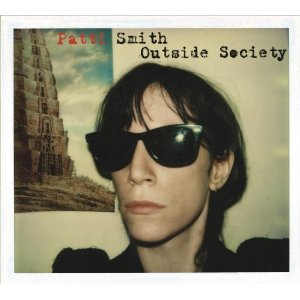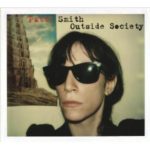
Arista/Columbia/Legacy
Outside Society does an excellent job as a sampler of Patti Smith’s recording career thus far. While the “high priestess of punk” label has (appropriately) stuck hard to Smith, the broad expanse of music and emotions offered on Outside Society reminds the listener that she is also a sister, a warrior, a lover, a wife/widow/mother – and, above all, a human. Whether she’s doling out sharp-edged social commentary (“Summer Cannibals”), walking slowly through a lush, almost U2-like field of knee-high sound flowers (“Beneath The Southern Cross”), or offering up a stripped-down piano-and-vocal arrangement (“Trampin’”), Smith’s honesty is a constant, regardless of the genre.
Consider “Ain’t It Strange”: guitarist Lenny Kaye’s deftly-picked intro leads the way into a study of how to get the job done right when it comes to white girl/boy reggae. Instead of coming out of the hole with a “See, we’re cool – we got rhythm … uh, riddim” that befalls so many attempts, the band slowly builds the groove piece by piece, confident enough in the realism of what they’re doing to not have to rush getting there. They dance through the middle of late 60s/early 70s Trenchtown and eventually take it somewhere even deeper, powered by Jay Dee Daugherty’s powerful drumming and Smith’s soul-wringing testifying. Simply brilliant.
When it comes to classic punksquall, “Rock N Roll Nigger” deserves its place on that world’s piss-stained altar. The cut begins with a live and raw Smith rapping over the audience’s handclaps and stomps. She eventually outpaces them, pummeling them with blows of truth as the band blasts off. “Outside of society is where I wanna be!” sings Smith – and she slings and spins the N-word around her head, body-slamming it to the floor. By the time the song’s over, the word is powerless.
Smith and company have always been fierce interpreters of others’ music: Van Morrison’s “Gloria” (from Horses, Smith’s 1975 recording debut) is transported far beyond the usual bar band treatment with Smith’s own spoken-word intro leading the way into the song itself. The tempo slowly builds from gentle glide to full-throttle charge, Smith’s growling/yipping/snarling/punched-out vocal promising (and delivering) more than anyone else’s has ever managed to do. Her acoustic 2007 cover of Nirvana’s “Smells Like Teen Spirit” (from Twelve) makes use of banjo, fiddle, and Smith’s own original poetry to take the song from auditorium anthem to tin-shack reality. The band strips away the glossiness of the Byrds’ original take on “So You Want To Be A Rock & Roll Star” to let the tune’s true-grit core shine through, again combined with a savagely-appropriate Smith poem dealing with Sid Vicious’ violent attack on her brother Todd back in December of ’78. (As Smith writes in the song’s liner notes, “Both of them are now deceased, but they are embedded, like strange brothers, within our performance.”)
And sorry, Bruce: just as Levon Helm took over the ownership of Mr. Springsteen’s “Atlantic City” back when The Band recorded it in 1993, “Because The Night” became Patti Smith’s just as soon as she chose to tackle it back in ’73. From Bruce Brody’s beautiful piano work to Lenny Kaye’s soaring guitar solo to Smith’s vocal (which declares rather than pleads), this is the version of this song. And if that wasn’t enough, Smith out-Bossed The Boss the following year with her own song, “Frederick” (written for her husband, the late Fred “Sonic” Smith) – all beautiful ache and longing.
I referred to this album as a sampler of Patti Smith’s recording career “thus far” in my opening sentence. Outside Society definitely makes you wish that statement to be true.



No Comments comments associated with this post